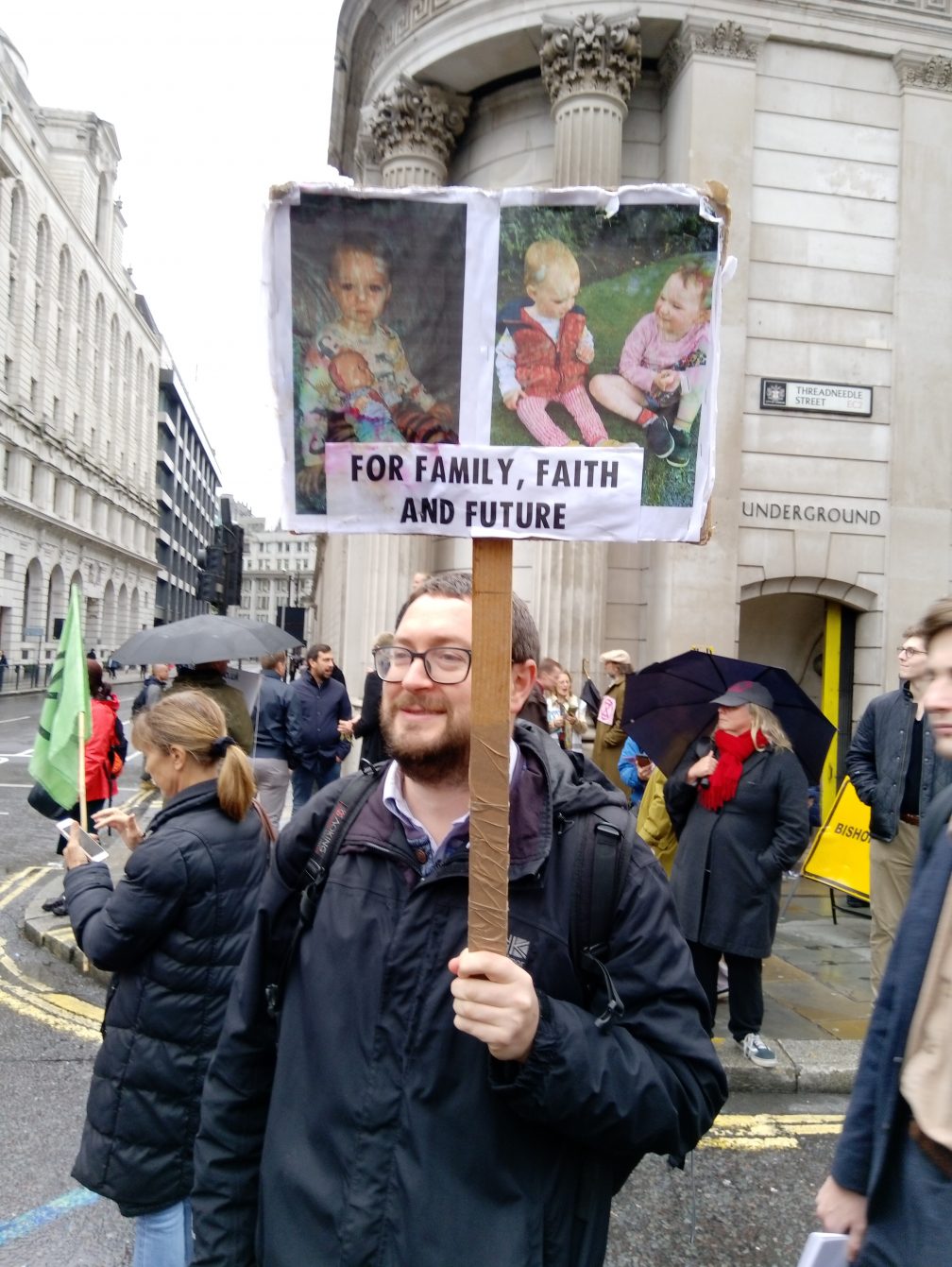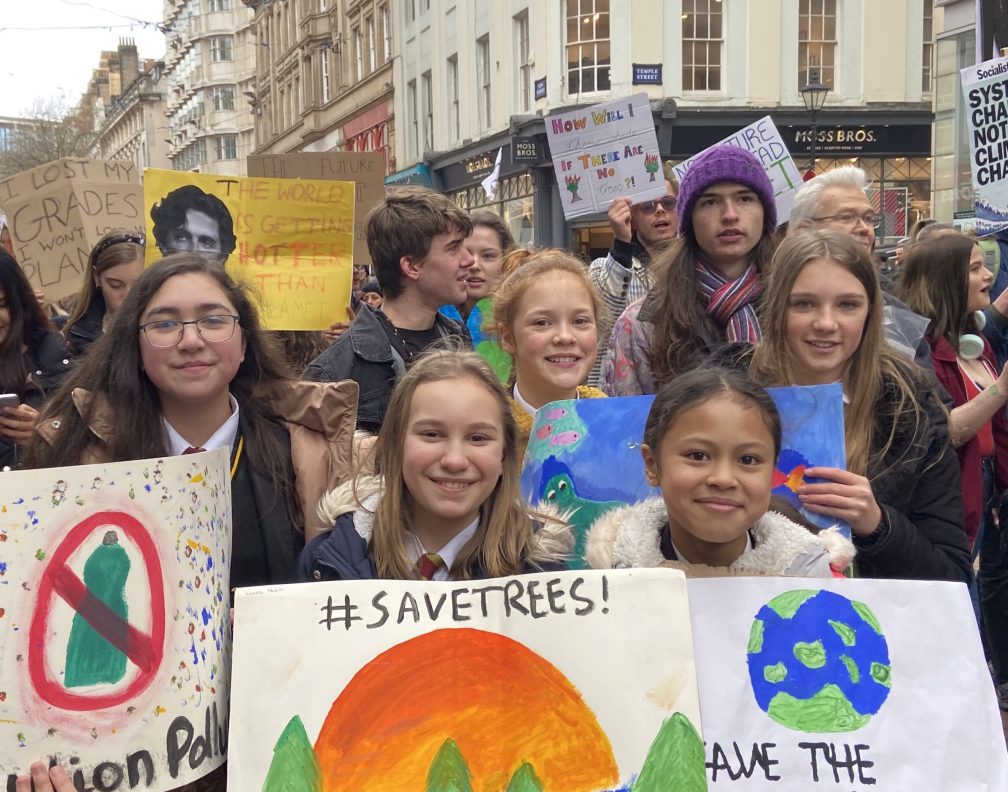We pray particularly for James, our Justice and Peace Education Worker, as he helps young people and educators explore the relationship between faith and action. His contributions to mission in Britain include retreat days and workshops for educators and young people, virtual encounters with missionaries and activists around the world, and supporting the young adults in our ‘Faith in Action’ Volunteer Programme.
During this Season of Creation it seems fitting to highlight some of his work supporting young people’s action for our common home.
Young people’s action for our common home
“Change is coming, whether you like it or not”, Greta Thunberg warned the world and sure enough, she ushered in a new era of young people taking unprecedented action for our common home. What are the significant moments that to lead to a young person taking decisive action? And how can we best support, celebrate and walk alongside young people on these journeys?
Moments of grace: Ecological Conversion
Some of the best days I’ve had working with young people have been in a community garden with missionary Sam Ewell, touching worms, planting things and chasing chickens. It’s messy, simple and joyful. And one of the greatest things about those days is that I get to witness a gentle unfurling love a young person has for creation. Amongst the muddy fingers and the giggles in the fresh air, there is a appreciation of nature tenderly arising in small moments.
It is moments like this that are the beginnings of ‘ecological conversion’. It is important for us to do what we can to facilitate opportunities like this, where young people can encounter nature. The Columbans in Britain are blessed with a beautiful house and grounds, and over the past couple of years we have been running eco-retreats there with school groups. We have developed a day for children which draws upon Laudato Si’ and is topped and tailed by a time of prayer and reflection. The retreat gives the children a chance to explore creation in a hands-on way, through activities such as bark rubbing, a scavenger hunt, pond dipping (meeting newts!) and sketching. A highlight for the older children was using our new electronic microscope – seeing the stings on a stinging nettle and the grime on their own fingers provoked quite a reaction!
“Nature is filled with words of love” (LS 225), and as young people fall in love with creation, this love spills out into action. As Pope Francis reminds us, “Love, overflowing with small gestures of mutual care, is also civic and political, and it makes itself felt in every action that seeks to build a better world” (LS 231).
Something that has encouraged me over the last year is that a growing number of the events and conferences I have been attending and running sessions for have been led and organised by young people. The Holy Spirit is alive and busy! Teenage Columban Journalism competition winner Anna Marshall says, “there is a hunger in young people for doing good things”. Anna and her sister have now organised two conferences exploring Catholic Social teaching and action against climate change – both have been inspirational. Gabriela Fanucciu, another journalism competition winner, says, “the responsibility of nurturing the earth cannot rest with a minority of its inhabitants; we must all share the obligation.” Pope Francis reminds us that “we need a conversation which includes everyone, since the environmental challenge we are undergoing, and its human roots, concern and affect us all” (LS 14).
There is great hunger in young people, not just to be part of the conversation, but to be part of the solution.
The pen is mightier than the sword?
We’ve just come to the end of our third ‘Columban Journalism Competition’, a joint initiative with the Irish Region. This competition encourages students to go deeper and to use their journalistic writing and mobile skills to look at a topical issue which is relevant to Catholic Social Teaching and resonates with Columban mission. There are two categories, writing and video, and leading journalists in Britain and Ireland judge the entries.
This competition has brought to light some incredibly insightful work from young people. For example, Kit Bell, a 2020 competition winner from All Saints Catholic School in Sheffield, writes about our ‘throwaway culture’:
“When asked for his opinion on the matter, Pope Francis offered a unique take: that our careless attitude toward things we no longer need has spread past material possessions. The way we treat those on the edge of our society is all the proof we need to see that he is right – the elderly, left to fade into an undignified end; those with disabilities, left to struggle until they can no longer cope; the homeless, left to scavenge for our cast-offs, as if we can offer nothing else. The invisibility of those we have no use for shows how much the consumer mindset has poisoned our humanity. We simply throw away people we think we don’t need, whilst keeping those who promote this toxic ideal.”
Kit ends her piece saying, “indifference and selfishness are the only true drivers of this throwaway culture – so maybe it’s time for a change of heart.” Read her full article here.
These essays are just a small glimpse into the audaciousness of young people and how they demand change. They also reflect a maturity of introspection, looking closely in the mirror and asking themselves how they can make changes too. Maureen Onwunali submitted a powerful spoken word poem for the competition which touched upon changing shopping habits: “Ordering next day delivery for a one day event… that fast fashion with fading fabric filling your closet with trends, that textile waste tailored to your taste”.
I’d encourage readers to listen to the words of our young people – be encouraged, challenged and inspired!
Faith and action
Over the years I’ve attended quite a number of climate change marches and protests, but it feels like there’s something different in the air at the moment. The average age seems to be decreasing! There has been a growing interest and hunger from students to organise and make change. Collective action can bring about a great sense of encouragement and confidence, and these young people really believe that change is possible and that they have influence. Researchers at the University of Sussex found that the prevailing emotion after a protest was happiness. This doesn’t surprise me and I feel this is especially true of student-led protests. There is a lively optimism at the heart of it and these protests become powerful formative experiences for other young people to come along, take part and catch fire.
It has been my great privilege to lead retreat days for young people that include taking part in climate strikes. What a beautiful way of expressing Columban commitment to the cause and supporting young people’s actions. This began during a retreat day for 200 secondary school students during which I facilitated an interview with Jane Mellett in Dublin, sharing her experience of taking part in the Climate Pilgrimage, attending UN climate talks and supporting climate strikes in Ireland. Following this, a small group of students asked for help to go deeper and so we led a day for them. This included joining the youth climate strike in Birmingham and a powerful online conversation with an activist in the Philippines. Here’s what some of the students took away from the experience:
This proved to be the first of many retreat days based around climate strikes. The days have included lectio divina, online encounters with activists and missionaries experiencing the impact of climate change today, meditation, banner making – and even marching together with a group of young refugees. Those that have participated have been incredibly enthusiastic, and for many it has been an eyeopener, seeing the relevance of faith to action for the common good.
And in conclusion…
So what have I learnt from all the above? I feel challenged and encouraged to…
- Give young people opportunities to fall in love with creation – and creator.
- Listen to them, creating space for their voices.
- Walk with them, march with them, empower them to make change, doing my best to not get in the way!
Above all, I believe that it is important to support and encourage young people to put faith into action.


